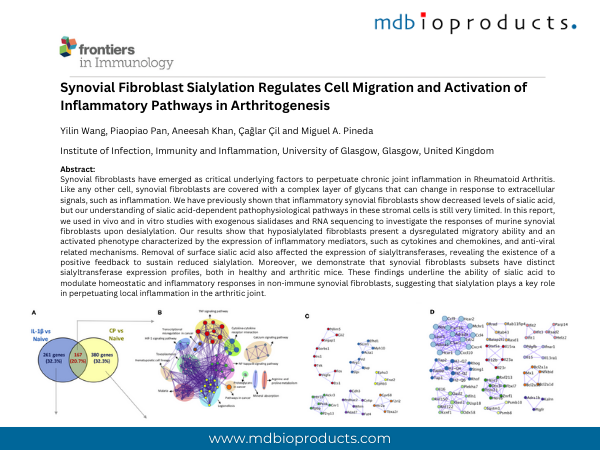
Featured Publication in Focus: Synovial Fibroblast Sialylation Regulates Cell Migration and Activation of Inflammatory Pathways in Arthritogenesis
Mar 26 , 2024
Authors:
Yilin Wang, Piaopiao Pan, Aneesah Khan, Çağlar Çil and Miguel A. Pineda
Institute of Infection, Immunity and Inflammation, University of Glasgow, Glasgow, United Kingdom
Frontiers. Frontiers in Immunology. 18 March 2022
----------------------
Products referenced:
Catalogue # 804002-sol
Collagen Type II, Chicken, Soluble, 2 mg/mL
Catalogue # 501009
Complete Freund's Adjuvant, 4 mg/mL (5 mL)
----------------------
ABSTRACT
Synovial fibroblasts have emerged as critical underlying factors to perpetuate chronic joint inflammation in Rheumatoid Arthritis. Like any other cell, synovial fibroblasts are covered with a complex layer of glycans that can change in response to extracellular signals, such as inflammation. We have previously shown that inflammatory synovial fibroblasts show decreased levels of sialic acid, but our understanding of sialic acid-dependent pathophysiological pathways in these stromal cells is still very limited. In this report, we used in vivo and in vitro studies with exogenous sialidases and RNA sequencing to investigate the responses of murine synovial fibroblasts upon desialylation. Our results show that hyposialylated fibroblasts present a dysregulated migratory ability and an activated phenotype characterized by the expression of inflammatory mediators, such as cytokines and chemokines, and anti-viral related mechanisms. Removal of surface sialic acid also affected the expression of sialyltransferases, revealing the existence of a positive feedback to sustain reduced sialylation. Moreover, we demonstrate that synovial fibroblasts subsets have distinct sialyltransferase expression profiles, both in healthy and arthritic mice. These findings underline the ability of sialic acid to modulate homeostatic and inflammatory responses in non-immune synovial fibroblasts, suggesting that sialylation plays a key role in perpetuating local inflammation in the arthritic joint.
To continue reading and to download the publication:
